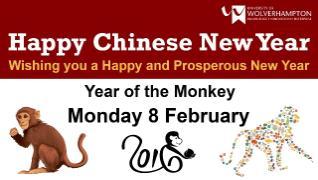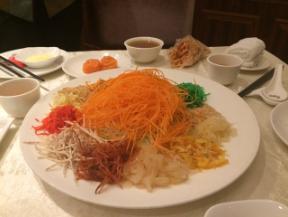
The customs behind Chinese New Year – Happy Year of the Monkey!
 The University of Wolverhampton wishes its students and staff a very Happy Chinese New Year 2016. Celebrations start across the globe from Monday 8 February, as Year of the Monkey commences.
The University of Wolverhampton wishes its students and staff a very Happy Chinese New Year 2016. Celebrations start across the globe from Monday 8 February, as Year of the Monkey commences.
If you were born in Year of the Monkey – dates include 2004, 1992, 1980, 1968 and 1956 – you are believed to be energetic, versatile, bright, mischievous, quick-witted, sociable and self-assured particularly when it comes to making decisions about finances and careers.
Jo Gittens, Director of the University’s International Centre, explains more about some of the customs behind Chinese New Year.
“The Chinese zodiac calendar comes around every 12 years, and each year is an animal. There are 12 animal signs – monkey, rooster, dog, pig, rat, ox, tiger, rabbit, dragon, snake, horse and sheep.
“The Year is also made up of four elements – wood, fire, Earth and metal. So this year is the Year of the Fire Monkey. I was actually born in the Year of the Fire Monkey – so a double whammy!
“The Chinese New Year period is over 15 days and the Chinese will wear red over this period. Red is seen as auspicious. Black is a no-no.
 “On the eve of Chinese New Year, there will be a family reunion dinner. In China, people like to eat dumplings and in Hong Kong it’s hot pot or steamboat. In South East Asia - such as in Singapore, it’s ‘Lo Hei’. This is the tossing of vegetable salad; it’s made up of seven different vegetables and whilst tossing the vegetables, auspicious phrases are said.
“On the eve of Chinese New Year, there will be a family reunion dinner. In China, people like to eat dumplings and in Hong Kong it’s hot pot or steamboat. In South East Asia - such as in Singapore, it’s ‘Lo Hei’. This is the tossing of vegetable salad; it’s made up of seven different vegetables and whilst tossing the vegetables, auspicious phrases are said.
“Fireworks are set off at midnight into Chinese New Year Day, and cherry blossom and mandarin oranges feature in homes.
“On Chinese New Year Day, people visit friends and relatives. Red packets called lai see, or lucky money, are given out to children and any unmarried individuals. Normally people will visit the eldest of the family first.
“On the 7th day of Chinese New Year, it’s 'everyone’s birthday' - known as 'Yan Yat' – and we all celebrate again.
“The 15th day is called Chap Goh Mei – in some parts of China this is the most romantic day, similar to Valentine’s Day. It’s the day that single women will throw mandarin oranges into the river as a gesture of hope to wed good husbands!
“There will also be another reunion dinner to finish off celebrations.”
Did you know...At the University of Wolverhampton, we have 200 international students from China. Find out more about our international recruitment at International
For more information please contact the Corporate Communications Team.


/prod01/wlvacuk/media/departments/digital-content-and-communications/images-2024/240328-Varsity-Line-Up-Resized.jpg)
/prod01/wlvacuk/media/departments/digital-content-and-communications/images-18-19/220325-Engineers_teach_thumbail.jpg)
/prod01/wlvacuk/media/departments/digital-content-and-communications/images-2024/240515-Spencer-Jones-Award-Resized.jpg)
/prod01/wlvacuk/media/departments/digital-content-and-communications/images-2024/240320-Uzbekistan-Resized.jpg)
/prod01/wlvacuk/media/departments/digital-content-and-communications/images-2024/240229-The-Link-Resized.jpg)
/prod01/wlvacuk/media/departments/digital-content-and-communications/images-2024/240516-Andy-Gibson-Resized.jpg)

